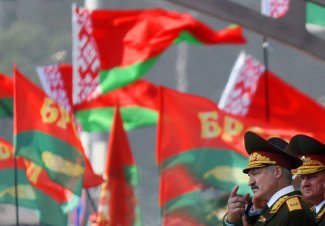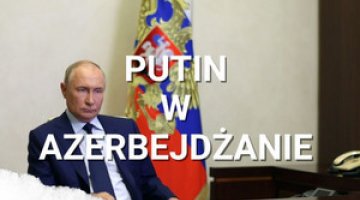Russia puts pressure on Belarus

On 13 December, at a meeting of the Belarus-Russia Union State Council of Ministers held in Brest, Russian Prime Minister, Dmitri Medvedev, publicly talked about two scenarios for further integration of the two countries. The first would be to maintain the status quo, which in principle means the free flow of goods, services, and labour, the functioning of the core political bodies of the Union State, which reach decisions with regard to integration by way of consensus, and close military cooperation. The other scenario would be one of close integration, creating new joint state institutions (such as inspection authorities, customs services, the judiciary), a single currency (single issuing centre) and, above all, adopting a Union State Constitution. Medvedev says that this scenario would provide the assurance of equal economic conditions (such as prices of raw materials) for Belarusian and Russian firms (a proposal being sought by Belarus). Medvedev also suggested, yet did not state explicitly, that speeding up integration would open the way for Russia’s subsidies to Belarus to be increased.
On the same day, Belarusian Prime Minister, Siarhei Rumas, said that the previously planned bilateral treaty on mutual recognition of visas would not be signed because more consultations were needed within the Belarusian government. In response to Russia’s proposals, the President of Belarus stressed at a press conference held for Russian journalists that Minsk would not be blackmailed when making decisions regarding integration, but that at the meeting with President Vladimir Putin scheduled for the end of December he would bring up the question of “whether it was advisable to incorporate Belarus into Russia”.
Prior to the Brest meeting, there was a meeting on 6 December in St. Petersburg of the High Council of the Eurasian Economic Union. At the meeting, a public row erupted between Alyaksandr Lukashenka and Vladimir Putin regarding the pricing of Russian gas for Belarus (which Minsk considers too high). In addition, according to unconfirmed reports from Interfax, on 11 December, during bilateral talks between Belarus and Russia on the conditions for supply of energy resources for Belarus, Russian Deputy Prime Minister, Dmitri Kozak, stated that Moscow’s consent to energy subsidies would depend upon Minsk’s consent to further integration within the Union State.
Commentary
- Statements made by top Russian politicians are in the form of ultimatums and are an element of the Russian diplomatic offensive that has been pursued since the summer, with the aim of redefining Russian-Belarusian relations and further subjugating Belarus through more intense integration within the formally existing Union State.
- There are a number of reasons for Russia’s attempt to speed up and extend bilateral Russian-Belarusian integration. At the tactical level, it is an attempt to force the Belarusian authorities to comply with the main demands that Russia is making at the moment, which include introducing an efficient uniform visa zone (this is dependent upon creating an efficient system of joint control of Belarus’ external border, which would prevent the Belarusian authorities from formulating visa policy by themselves); a demonstrative increase in Russia’s military presence in Belarus (including missile systems and combat aircraft); the takeover of some Belarusian business by Russian firms.
- At the strategic level, Russia’s actions are an attempt to achieve three main goals. The first is demonstrating Russia’s strength and influence, in order to mask – for political and PR purposes – Russia’s failures in thepost-Soviet area , especially failure of Russia’s policy of subjugating Ukraine, problems with the functioning and lack of measurable progress in integration within the Eurasian Economic Union, and Russia’s lack of control over the change of power in Armenia. Secondly, this is an element of what Russia perceives to be a strategic response to the reinforcement of NATO’s eastern flank (including in the direct vicinity of Belarus) and to formal progress in European integration of some of the EU’s Eastern European partners (agreements on association and deep and comprehensive free trade areas and visa-free travel with Ukraine, Moldova, and Georgia).
- Another reason for Russia applying pressure on Belarus is its attempt to improve Vladimir Putin’s declining approval ratings by achieving a symbolic geopolitical success, by making Minsk more dependent on Moscow, yet it might also be aimed at devising a scenario for solving the formal problem of the final term of office of President Putin under the Constitution by taking up by Putin a post of head of the Belarus-Russia Union State, which could be taken if he decided to formally leave the post of president of Russia (which is not prejudged).
- In recent months, Minsk has been working intensively to improve cooperation with Moscow with regard to energy. For years, Russia has been Belarus’ sole supplier of gas, and almost its sole supplier of oil. The large part played by the petroleum sector in generating revenue from Belarusian exports (in 2017 as much as 1/5 of total revenue), the almost total (approximately 90%) reliance on gas for electricity production, and the highly inefficient and outdated industrial infrastructure, mean that securing favourable conditions for the supply of energy resources from Russia is crucial for the survival of the Belarusian economy.
- With respect to gas, Minsk is seeking equal prices for Belarusian users to those paid by Russian users (based on the price for the Smolensk region). At the moment, Belarus pays between USD 129 and USD 132 per 1000 m³, while on the other side of the border the rate is USD 70 USD per 1000 m³. Under a bilateral agreement signed in April 2017, the price for next year will be USD 127. To date the parties have not agreed upon the pricing policy for the coming years, but Belarus is seeking equal prices from 2020, arguing that only in that situation will Belarusian exporters have a realistic chance of competing with Russian exporters. Minsk is inclined to intensify its efforts in this area due to the deteriorating balance of trade with Russia. From January until October this year, the deficit was USD 8.1 billion, up more than 3 billion on the same period last year. A decrease in the price of gas would not only place Belarusian exporters in a better position, it would also automatically reduce the value of imports from Russia. The proposed date of 2025 for the Eurasian Economic Union to introduce a single gas and oil market is too distant for Minsk, especially as there are more and more factors indicating that the decision in this matter could be postponed.
- Belarus’ situation with regard to oil is even less favourable. The tax reform introduced in Russia in the petroleum industry is gradually erasing Belarus’ current preferential pricing for purchases of Russian oil. As a result, Belarus’ losses in 2019 will be approximately USD 300 million, and will rise to USD 2 billion (almost 4% of Belarus GDP) in 2024. Minsk has estimated the total cost in the next five years to be between USD 10 and 11 billion, indicating that it does not have a solution for plugging such a serious gap in revenue for the budget and for Belarusian refineries. For this reason, Belarus is also trying hard to obtain compensation from Moscow, while negotiations currently indicate that the parties cannot reach an agreement as to the form in which it should be paid. Belarus is pressing for a lower price for oil, while Russia is proposing transfers from the Russian Federation budget, which is a solution less favourable to Belarus.
- Reducing energy subsidies and/or making them conditional upon political concessions with regard to integration within the Union State places Lukashenka in a difficult position. On the one hand, he is aware that the Belarusian economy could collapse if it is not propped up by Russia. The economic reforms carried out by Minsk are fragmentary and are limited to certain spheres, and do not include the state industrial sector, which is reliant upon Russian subsidies. This is leading Lukashenka to make increasingly firm, and sometimes equally emotive, demands upon Moscow. On the other hand, Belarus is not interested in full integration with Russia, even within the existing Union State structures, as it would lead to surrender of sovereignty. This scenario would de facto render Lukashenka powerless and would also represent a direct threat to his safety.
- Minsk will continue to delay the process of integration within the Union State, as it has done almost since the agreement creating the Union was signed in 1999. In this context, suddenly blocking the agreement that is now ready to be signed on mutual recognition of visas (despite procedural matters being given as the official reason) is a political demonstration of Belarus’ objection to Russia’s moves towards unification of the standards and legal procedures of the two countries. It is also possible that Moscow tried to insert new clauses unfavourable to Belarus into the document at the last minute. Thus, tensions can be expected to escalate in the near future, especially if the next meeting between the two presidents, scheduled for the end of this year, does not produce any breakthrough, particularly regarding the issue of energy subsidies, which are a priority for Minsk.




